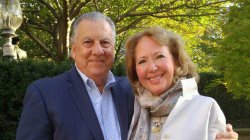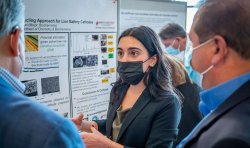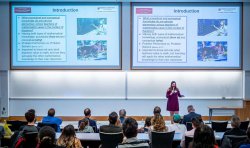Entrepreneur Mario M. Casabona Invests in a World of Opportunity at Montclair
Posted in: Montclair State University Donors

Entrepreneur and angel investor Mario M. Casabona has a keen eye for a good investment. As the founder of TechLaunch and Casabona Ventures, LLC, he dedicates his career to nurturing new ideas, and the talent behind them. As a philanthropist, he recognizes Montclair State University’s potential as a higher education and research powerhouse, and as an important contributor to New Jersey’s ecosystem.
“Even though Montclair is not my alma mater, I see the strength and growth potential of the University and I want to invest in it,” Casabona says.
Through his involvement with – and support for – the College of Science and Mathematics (CSAM), Casabona is promoting student experiential learning across a broad array of STEM fields. “The University’s goal is to be a research-driven solutions generator intertwined with the educational mission. CSAM is committed to building community collaborations and partnerships to solve real world problems and train a diverse and creative STEM workforce for New Jersey and beyond,” notes Dean Lora Billings.
Casabona is an electrical engineer by training and owner of six national patents in the field of satellite-based navigation and communications. In 1982, Casabona formed Electro-Radiation Inc. to build radar, navigation and communications technology for the defense industry. The company was acquired by Honeywell International in 2004. By 2006, the entrepreneur created Casabona Ventures, investing in seed and early-stage companies.
Casabona first connected with CSAM through the Research & Development Council of New Jersey. “I began to learn about Montclair’s mission and about its vision for the College,” he says. “They were doing research in disciplines ranging from biology to computer science. It was very forward thinking, and also in alignment with my own view of the future; I wanted to be part of it.”
When the invitation came to join the CSAM Advisory Board in 2011, Casabona was happy to accept. Within a year, Casabona and CSAM were collaborating on a new initiative to create the state’s first technology accelerator.
“The TechLaunch accelerator I brought to former Dean Robert Prezant has always included opportunities for students to get involved,” says Casabona. TechLaunch currently provides entrepreneurs with several weeks of coaching and access to a stable of more than 150 mentors. The TechLaunch experience culminates with a Shark Tank-like pitch event called the “BullPen” that provides participants with a platform for presenting their ideas to potential investors. The start-up deemed most fundable is awarded $15,000 in services.

“I really enjoyed working with Montclair to create opportunities for early-stage tech companies that are preparing for growth,” Casabona says. “I began thinking about how else I could get involved with and support the University and its students. I wanted to do something extra.”
He had been reflecting on his own career trajectory, and about what he saw as a real need among the young entrepreneurs he met. “When I was working toward becoming an engineer, I didn’t have an opportunity to learn how to make presentations in front of an audience,” Casabona explains. “I suspected that there were students in science and technology majors who would benefit from a program to strengthen their communication skills.”
Realizing the solution was an event that showcased the communication skills of fellow students, Casabona worked with CSAM to develop the Mario M. Casabona Future Scientists Awards Program. He also provided the philanthropic investment needed to launch the initiative.
Casabona Future Scientists are trained to convey their scientific research to the general public and non-science professionals. The program focuses specifically on encouraging students to enhance the communication and presentation skills that are essential for explaining ideas to non-science audiences. “Communication skills, in particular the ability to effectively communicate complex scientific and technological information in layman’s terms, are crucial for every STEM professional, regardless of their discipline or career path,” Casabona says.
“I never went through a formal class or program to learn how to make presentations,” he continues. “I had to learn through trial and error. This program addresses an important gap in how we prepare young people for success.”
It also is representative of the College’s commitment to providing high-value experiential learning opportunities and cutting-edge research for students and the dedicated faculty members who train them. Hands-on participation in research helps students identify their own passion within their discipline, while also helping them develop skills that will enhance their career prospects.
With Dean Billings’ leadership and Casabona’s continued generosity, the Casabona Future Scientists Awards Program has been expanded and now takes place each semester, giving even more students an opportunity to participate. “Our CSAM research students are able to explore and apply classroom lessons in real time, year-round. We have built a community that supports student-faculty research and the events that share results,” says Billings. “The ability to communicate science and technology concepts is a powerful force multiplier, which helps educate and build trust across our communities.”

The program is very empowering for the students who participate, inspiring for the mentors, and personally rewarding for Casabona – an added bonus to a partnership that provides real value to students, to the University, and to the state. “The campus is diverse, and so many students have an immigrant background,” he says. “As a first-generation American myself, I can relate to that. The professors care and students know that. Everyone is working hard to realize a greater potential.”
Casabona is among a growing number of philanthropists who support colleges and universities they did not attend. Nationally, giving from non-alumni individuals is on the rise, and according to the Council for Advancement and Support of Education it comprised 16.6% of all giving to higher education institutions by 2021.*
“Investing in Montclair is a way for me to support the New Jersey ecosystem, and I have seen the University make such progress,” Casabona says. “The institution has invested in bringing recognized academics to campus who have, in turn, been successful in attracting significant funding for research and programs. It is very exciting.”
“We are deeply grateful to donors like Mr. Casabona, who recognize the impact Montclair can have on so many aspects of New Jersey’s economy and in advancing the greater good,” says Vice President for Development Colleen Coppla. “His support is transforming students’ chances for success, while helping them bring innovative ideas into the marketplace and into our communities.”
When the opportunity presents itself, Casabona encourages other business leaders to see the investment potential that he has witnessed at Montclair. “Once you get involved and get to know the University, you begin to understand that there is real momentum, and real value here.”
*Source: Council for Advancement and Support of Education, Feb. 16, 2022:
https://www.case.org/resources/voluntary-support-education-key-findings-2020-21
